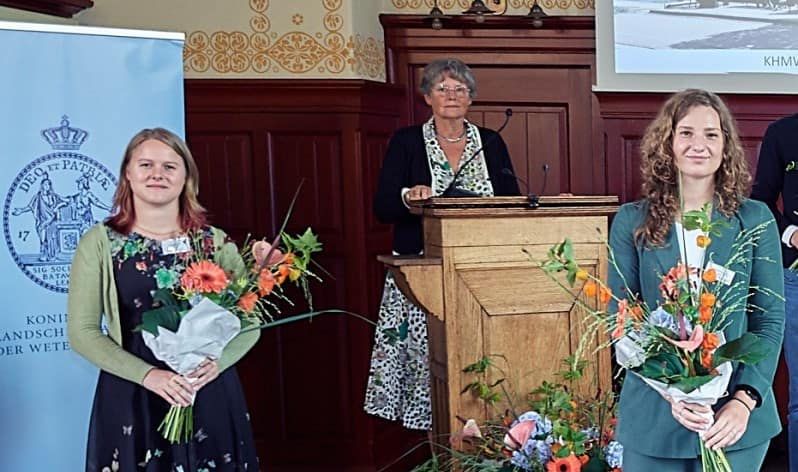
Duo interview with Jan Brouwer thesis prize winners (Chantal D’Amore & Rinske Vermeij)
The Jan Brouwer Scriptieprijs is awarded every year by the Koninklijke Hollandsche Maatschappij der Wetenschappen (the Royal Holland Society of Sciences and Humanities) to recognize the best master thesis in the country across eight categories. Last year, two students from the Heymans Institute captured both of the awards that relate to our interests: Chantal D’Amore (Social Psychology) won for social sciences with her thesis on polarized political debates and how these dynamics can shape individuals’ beliefs about what is fundamentally “right” versus “wrong.” And Rinske Vermeij (Theory & History of Psychology) won for behavioural sciences with her thesis on the place of qualitative research in psychology (in anticipation of the new APA guidelines that have since recognized qualitative inquiry as a valid and important kind of empirical research). In this duo-interview, they engage in a conversation about their time in their master programmes, how they did they research, and what helped them achieve their success.
What was it like to win the “best thesis” award in the whole country from the Royal Society?
Chantal: It was very special to receive this phone call, and to hear that other people saw such value in my thesis research. This was particularly positive because at the time, I had already started my PhD (in the same topic). Winning this award then really boosted my confidence: all of a sudden, I knew that this type of research would be appreciated by others. And that was an especially exciting way to start my PhD project!
Rinske: It was really nice!
After my master, I had wanted to continue in academia but there didn’t seem to be the opportunity to do so at that time. So I had left the university, somewhat disillusioned and disappointed. It was on the second day of my proper grown-up job that they called to say that I had won!
I was so happy. The next day, I treated everyone in the office to pie!
Knowing I had won this prize, I also experienced a sense of fulfilment and peace. I felt like even if I did not succeed in finding a PhD position, or in getting something published, I could be content: I had done my best, and it was good. Fortunately, I still landed a PhD position in the end. But most of all, at the time, I considered the win to be a confirmation that the topic and message of my thesis was important: qualitative research is properly part of psychology!
In retrospect, how do you feel now about your time in your master programme?
Rinske: I really liked how Theory & History of Psychology is relatively ‘free.’ It is very much based on the students’ own motivation and effort.
It is possible, of course, to just do the courses and get the degree. But the more effort and attention I dedicated to the assignments, and the more involved I became in discussions with the professors, the more room there turned out to be to use the assignments to explore the topics I was excited about.
It was great how these were not designed as hurdles—as hoops to jump through—but each time provided new ways to approach my thesis topic. This meant that by the time I was supposed to start on my thesis, I found I had already considered it from multiple perspectives. This happened naturally because the program was structured to support me in writing about things I was already passionate about. And getting from there to a draft was much easier than the stereotypical thesis student’s months of staring into the abyss.
Chantal: I agree so much with this. The BSS Research Masters’ program provided me with a lot of freedom that helped me to explore and deepen my interest in the topics I am passionate about. This was not only about the freedom to select the courses, traineeship project, and master thesis that aligned with my interests. Perhaps even more important to me was the freedom I was given to seek contact and start working with the researchers I found inspiring, both in terms of their research and their way of interacting with us as students.
Although it can be difficult sometimes to deal with so many choices and (too) many opportunities to learn, I think that—in combination with the right supervision, training, and help from others—this strongly encouraged me to reflect on the broader goals to which my research would hopefully eventually contribute. One example is that I had the opportunity to write my own PhD grant proposal (together with my supervisor) at around the same time as I started my thesis, which naturally forced me to reflect on the bigger picture of my thesis from the very beginning.
Rinske: Indeed, I learned that it matters a lot how you approach your studies. There are many reasons to do a master degree, and these choices can themselves limit or enhance the possibilities for success. One of my primary goals was to learn as much as possible. This meant keeping up with the readings and going to all of my classes, but that was really the minimum. I tried to go much broader than that.
Book-smarts are important, but that has never been an area in which I really set myself apart. (I don’t read as quickly as I’d like to, and have to revise more than it seems others have to in order to retain everything.) But there is also an important social dimension to the academic world that, if you appreciate it, can open or close many doors. Without the social side, you just never find out what you might have considered. That aspect stays invisible to you, and inaccessible (and illegible).
So it wasn’t just you and your supervisor alone against the world?
Chantal: Not at all. I really enjoyed being surrounded by a group of motivated students and inspiring researchers, all of whom shared a great enthusiasm for social sciences. Most of the time during my masters, I was together with my peers: we discussed our research ideas, and we asked each other for feedback. We also spent a great amount of free time together just for fun. This supportive social environment was really valuable to me.
Rinske: Yes, this social aspect was important for me as well. It’s really nice to have this community, and just being around them was also quite helpful. My approach of generally being well-prepared and willing to help both fellow students and staff with things such as feedback or collaboration gave me access to many valuable learning experiences. And as an added bonus, I could then use these things I’d learned to refine my own ideas.
Chantal: Indeed. And speaking of great people: my supervisor played a major role in how much I enjoyed my masters.
It was extremely valuable to find a supervisor that supported me like a mentor and encouraged me to trust rather than doubt my own perspective and research ideas. I think I was very lucky having such a supportive supervisor, not only in terms of research but also in my personal development more generally throughout the masters.
Rinske: I wholeheartedly agree. Finding a supervisor with whom you can work well and have a good click can make or break a thesis. And as you say, this importance isn’t limited to their feedback on the content. My mentor helped me become more confident in my own abilities as a writer. He also taught me that if I feel really strongly that something is important, this might very well be a legitimate path worth pursuing. In other words, he taught me to trust and to follow my nose.
Chantal: Totally! As the jury also noted, potentially uncomfortable research questions or conclusions shouldn’t stand in the way of conducting this research if it helps us better understand psychological or societal phenomena.
Rinske: Yes! It is good to be aware of the constraints and expectations of your research field. But we shouldn’t let ourselves be limited by them. These limitations change and evolve over time, and maybe it is our job as the “new-generation” to push them in the direction we believe will benefit the discipline. In my case, the jury report mentioned explicitly that it was exactly this pushing of disciplinary boundaries was an award-winning quality of my thesis. What do you think was important in tipping the scale in your thesis?
Chantal: Most important in my case, I think, was trying to make a bridge between abstract scientific theories and timely societal events in order to better understand how these events impact individuals within this societal context. This was a central theme in my master thesis: How can we integrate different scientific theories and use this to better understand pressing societal issues? How does a phenomenon of interest function in any real-world context and among the actual population of interest? And how can we select relevant societal contexts and populations that are particularly likely to in turn enhance our understanding of these underlying theories? At least in my research field, psychological processes are often intertwined with the social structures in which they occur, and therefore I think contextualizing this type of research can bring fruitful insights.
What do you mean exactly, when you talk about ‘contextualization’? (Because part of what we’re doing here is contextualizing your wins!)
Chantal: With this I especially refer to translating theoretically meaningful predictions to societally meaningful events. Initially, I entered the masters’ program with a main interest in research projects that are particularly valuable from a scientific and theoretical point of view rather than focusing on its applied “counter-side.” It’s not that I didn’t see value in applied research – on the contrary: I just came to believe that researchers must choose their focus because striving for both scientific and practical meaning at the same time could undermine the value of your research altogether. But through my thesis research I came to realize that the two can be highly complementary, which the jury highlighted to be a valuable aspect in this research.
Rinske: Indeed, I had a similar experience during my masters. In the bachelor, we were taught a very specific type of scientific research, accompanied by a very specific set of values that come with those methods. Briefly: that we need to measure, because otherwise how could we know for certain? And we tend to prefer the abstract and theoretical kinds of knowledge over the applied and real-world kinds, because the real world is messy. And we can’t have that!
Although I recognised them in myself, I thought these sentiments would be detrimental to the quality of our science. Because indeed, I had never even considered for a moment that there might be other, qualitative ways to research things too. And this was problematic because science can only benefit from looking at concepts from various different angles, instead of just one. Looking in new ways must allow you to see new things, and also to see things in a new way.
So, what you found with theory and application, I found as well concerning our methods: this “hierarchy of knowledge” that we both felt isn’t very helpful anymore. Both types of knowledge have a different kind of value. And thus the best results are gained, not by ruling out what is commonly regarded as “the weakest,” but by letting them complement each other. In other words, the future is interdisciplinary. But in real action, in science and scholarship, not just in talking about how we wish things were.
To watch a video of the socially-distanced awards ceremony, click here.
For videos of Rinske describing her research in more detail, click here; for videos of Chantal, click here.
Feature photo credit: Hilde de Wolf



